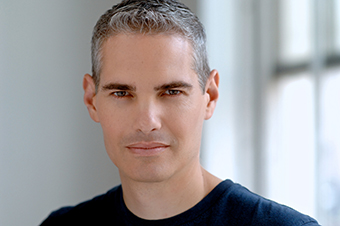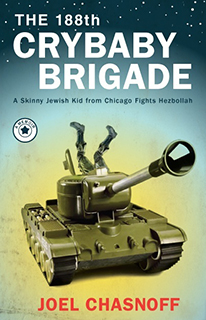‘G.I. Joel’
Permanent link All Posts
In the eighth grade, Joel Chasnoff, admits he was the only kid cut from the Solomon Schechter basketball team.
This was all the more shameful because “I’d been cut not just from a sports team, but from a Jewish sports team,” he writes in his book, The 188th Crybaby Brigade. But in his early 20s, despite his lack of athletic prowess, Chasnoff—a burgeoning Jewish comedian in New York City—decided to put his comedy career on hold to join the Israel Defense Forces, out of love for the Jewish State.
An Evanston native, married to an Israeli woman, Chasnoff returns to Chicago on Saturday, Feb. 16 for his solo show “G.I. Joel: A 24-year-old Stand-up Comic from Chicago Gets Drafted into the Israeli Army” as part of the Limmud Chicago lineup.
The 70-minute performance, adapted from his book The 188th Crybaby Brigade, chronicles Chasnoff’s experiences in 1997 and 1998 as a tank gunner in the Israel Defense Forces Armored Corps. His unit was responsible for defending Israel’s north, including the Golan Heights and the Syrian border. His service included two months of Basic Training, two months of Tank School, and three months of Advanced Warfare training, followed by a tour of duty.

Oy!Chicago recently interviewed the comedian in advance of his Chicago visit.
Oy!Chicago: How did G.I. Joel come about?
Joel Chasnoff: I've been speaking about the book for a couple years now. And whenever I have, I tried to make the stories I told as compelling and funny as possible. Those book presentations, combined with my stand-up comedy background, led me to create an actual show, with beginning, middle and end, that tells the story—in a comedic way—of my IDF experience.
Why was it important to you to write Crybaby Brigade in the first place?
As a stand-up comedian and actor, I'm a firm believer in the power of stories. I'd even say that we human beings are our stories: how we think of ourselves, others, and our lives is a reflection of the stories we tell ourselves. I truly felt that my experience in Israel—everything from the actual military service to the eventual questioning of my Judaism by the Israeli rabbinate—was a story that would resonate with others who think about, value, and struggle with Israel as I do.
How does the work lend itself to a one-man show? What’s different about the process as a book versus a performance?
The book is, in a way, a one-man book, since it’s first-person, non-fiction. I simply told my stories on the page, as opposed to the stage. The big difference is that in the book, I can take a lot of time and space to describe my feelings at certain moments, and descriptions of places and people… Onstage, the action needs to be quick; no one wants to spend 10 minutes hearing what a mountain looks like.
Why did you join the IDF? After all, many American Jews love and support Israel, but you took it a step further.
One, I felt a bit guilty that we American Jews call Israel the homeland but let Israelis bleed for it. I remember during the first Gulf War that bombs were falling on Israel and my synagogue recited Psalms and mailed care packages—which didn't seem like enough. And two—I was enthralled with Israelis from my visit at age 17 on—they were exciting, outspoken, and strong—and I wanted to be one of those Uzi-toting heroes like them.
What is the most important lesson you learned while serving in the IDF?
On a personal level, I learned that if one is passionate to do something (as I was to join the army), the best thing to do is simply to do it and take the risk that it won't work out. I would have felt something was missing from my life had I decided not to do it. On an army level, I learned a lot about friendship and what it means to both love a group of guys and, at the same time, not be able to stand them—and yet my platoon-mates and I emerged friends despite all the ups and downs…
How is your wife, Dorit? What does it mean to her as an Israeli that you served and to her family as well?
She didn't want me to serve at first—she thought real Israelis (not like the good ones they send to summer camps) would eat me alive. But now, it's allowed us possibly living in Israel one day to be more of a reality.
Are you excited to return to Chicago for the show?
I'm very excited to premier the solo show in Chicago, since I'm a native myself. The show will be a semi-workshop so after the performance I'll open up the room to notes, feedback, etc. This should be a fun experience for the audience.
Looking back, what is your favorite memory of the IDF?
Sitting on a mountain with my best buddy, Tomer, giving him advice about women after his girlfriend broke up with him during basic training—this despite the fact that I still know barely anything about women.
Joel Chasnoff will perform his one-man show “G.I. Joel” as part of Limmud Chicago’s evening program on Saturday, Feb. 16, at UIC Student Center East. For more information, visit www.limmudchicago.org.
To learn more about Chasnoff, visit www.joelchasnoff.com.



.jpg)



